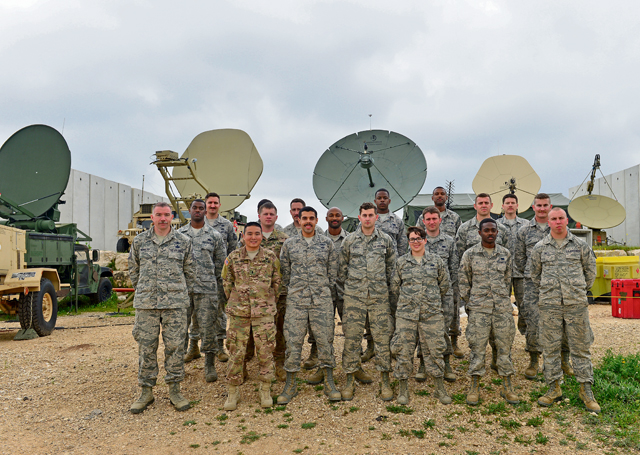
Airmen from the 1st Combat Communications Squadron and 52nd CBCS and Soldiers from the 44th Expeditionary Signals Battalion work together to support U.S. European Command exercise Juniper Cobra 16 March 3 in Israel. Juniper Cobra uses ballistic-missile defense computer simulations to train U.S. and Israeli service members while reinforcing a strong military relationship.
Approximately 25 Airmen from the 1st Combat Communications Squadron left Israel March 8 after providing network support that ensured the success of Juniper Cobra 16.
Juniper Cobra 16 is a combined ballistic-missile defense exercise held every two years by the U.S. European Command and Israeli Defense Forces. This year was the eighth in a series of biennial exercises of the two militaries since 2001.
Airmen from the 1st CBCS established networks as well as installed the infrastructure necessary to enable the ballistic-missile defense fight.
“We had to engineer an automatic connectivity fail-over capability between not only the Air Force and Army networks but the Israel Defense Forces as well,” said 1st Lt. Jonathan Garcia, 1st CBCS airfield systems flight commander. “It’s awesome to work alongside so many different people and see how they contribute to the mission.”
Though the role for Airmen was specific to ensuring network stability, each day came with new challenges for them to overcome.
“Our job was as simple as running and terminating Ethernet cables to as difficult as developing network architecture, which was required to support our capabilities,” Garcia said. “Every challenge we faced was a learning experience. We even worked alongside the U.S. Army, which garnered its own benefits to our growth as Airmen.”
During the exercise, more than 1,700 U.S. service members, civilians and contractors worked with the Israel Defense Forces to address computer-simulated challenges that may occur in real-world operations.
“This exercise is a significant milestone in the strategic relationship between the two countries, a security alliance unmatched by any other country in the world,” said Brig. Gen. Zvika Halmovich, Aerial Defense Division commander. “This collaboration reflects a commitment to protecting civilian lives, as well as a deep appreciation for the Israel Defense Forces, Israel Air Force and the Aerial Defense System.”
Along with exercising their cyber capabilities, the 1st CBCS Airmen also networked with their Israeli counterparts in hopes to build partnerships as well as improve current processes.
“At first, everyone stayed within their respective work areas, but not long after everyone started to open up and realize that the other units could make each other’s lives much easier, if we work together,” Garcia said. “The exercise enabled us to see how the Israelis operate so that we can identify areas for improvement and potentially develop best practices for both countries.”
Though the exercise lasted from Feb. 21 to March 4, Ramstein Airmen were in Israel from Jan. 9 to March 8 to provide additional cyber support for the exercise.
“The 1st CBCS has two teams dedicated to our mission at all times, one training while the other is standing by to deploy,” Garcia said. “We practice like we fight and are confident we’re ready to face any wrenches thrown at us.”
Throughout the exercise, both nations’ service members were tested on a variety of computer-assisted simulations ranging from ballistic-missile defense, crisis re-supply, foreign-disaster response and foreign-humanitarian assistance, and the skills gained through the trials faced will strengthen the militaries’ capabilities and established friendships.
“To the entire 1,700 total force Soldiers, Sailors, Airmen and Marines, civilians and contractors: Thank you for your selfless work and an incredible job well done,” said Lt. Gen. Timothy Ray, 3rd Air Force and 17th Expeditionary Air Force commander. “I’m very proud to be a part of this team. Thank you to the planners and white cell who ran the exercise and to our gracious Israeli hosts. The U.S. remains fully committed to the security of Israel and ready, tomorrow, next month or in Juniper Cobra 18.”


